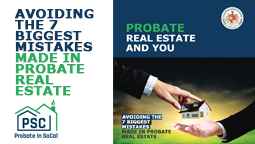Dealing with the death of a loved one is never easy, even when it is expected. Those who are left behind have to deal with the loss. They also have to deal with matters such as probate and other legal issues. One common point is the legality of living in a house that is going through the probate process.
Here are more things that will help you understand the probate process.
Real estate under California probate
Let’s say an individual who owns a home with other people passed away. One of the first questions to be resolved is how he or she held title to the property. The owner’s property interest will automatically pass on to the other surviving owners upon death in some form of title.
If the deceased owned the property in his sole name, the estate would likely go through probate.
The next thing that must be considered is if the deceased has left a valid Will. In the state of California, a Will is deemed to be valid if it is drafted and executed in the following way:
- A Will must be in writing (It can be either handwritten or typed)
- A Will must be signed and dated by the testator
- Witnesses must sign a Will (at least two witnesses)
- A Will must identify beneficiaries
A valid Will is likely to name an executor. An executor is a person appointed to administer the estate of the deceased. The executor’s primary responsibility is to carry out the instructions stated in the Will. He should also manage the affairs of the dead person’s estate. If the Will did not identify an executor, the court would appoint one.
During the probate process, the executor will do his due diligence to perform the discovery process (don’t take the discovery process lightly) and gather all the estate assets. Then, he will locate and pay the outstanding debts. Afterward, he will locate all the beneficiaries or heirs. The assets of the estate will be given to the beneficiaries named in the Will. If there is no Will, they will pass to the next of kin as per the intestate succession laws.
It is important to note that the executor must pay the taxes and estate debts before distributing the assets. But, there are cases when the deceased person’s house is heavily mortgaged. There are also situations when the estate has no other assets and has many debts. The executor may have to sell the home to pay off the creditors in these cases.
If there are enough funds to cover the debts, the house will likely transfer to the heir named in the Will. What if the deceased left no Will? The property then will assign under inheritance laws to the closest family members.
Renting out a probate property

There are no laws that prohibit the renting out of probate property. However, the circumstances in which this is workable and beneficial vary.
- Previously Established Rental Property
The situation will continue if the deceased has already rented out the property before his death. The lease signed by the tenants and the now-deceased landlord will remain in full force and effect.
What if the lease expires while the home is still going through probate? The executor then will decide whether to continue the rental status of the property. The executor should always consider which situation is in the estate’s best interest. He or She should also consider the following factors:
- Are there debts that cannot be paid without selling the rental property?
- Did the Will name a specific beneficiary to inherit the rental property?
- Property Not Rented at the Time of Death
The executor is also responsible for paying the deceased’s bills during the probate. Depending on the executor’s financial situation, the person may find this difficult. Renting out the property of the deceased may be a viable solution. This is a practical option since the probate process can take months or even years.
The executor has the power to act on behalf of the estate. But the extent of the executor’s authority varies by state. For example, in some states, executors have the control of renting a property under probate laws. In other states, an executor should get court approval first. But nothing in the direction forbids renting a property as it passes through the probate process.
Maintaining a home during probate.
The executor’s responsibility is to ensure that the deceased’s home is safe and maintained. The executor should keep making mortgage payments. He should also pay local property tax bills to avoid penalties.
The executor should also pay any property insurance premiums.

The executor also must ensure that the property receives essential maintenance such as mowing the lawn and cleaning out the gutters. If there are damages, such as a broken window or a roof that starts to leak, the executor handles the repairs.
It’s your job to see that the property receives essential regular maintenance. For example, you need to know that the furnace works in cold weather, so pipes don’t freeze and burst. And of course, you must repair any damage that occurs, such as a broken window or step or a roof that starts to leak.
Here are some tips to keep the home secure and well maintained if it is unoccupied while the probate process is ongoing:
- Put some lights on a timer to make the place look occupied.
- Ask a neighbor to pick up any free newspaper or flyers that get deposited on the porch or in the yard.
- Close all doors and windows and lock these where possible.
- If you don’t live close enough, find someone you trust to check up on the property every week to ensure everything is okay.
- Turn off any unnecessary utilities.
Selling a house in probate.

Selling probate real estate is different from a traditional home sale. There are timelines to be aware of and procedures to follow. You can not take any action until you have authority from the California probate court. This includes the sale of real estate. Legally navigating the process is no easy feat. That is why it is crucial to have expert help.
You need the help of a Certified Probate Real Estate Specialist. It would help if you had someone to guide the transaction to closure. A probate specialist will efficiently handle the process.
With a probate real estate specialist such as myself, you will have a trusted adviser.
I will assist you in preparing the documents needed to complete the probate process. I will also help you design the paperwork and notices to sell the property during probate. In addition, you can count on me to help you market the home, schedule showings for buyers, and negotiate offers.
If you need help selling real property through probate, contact me, Deepak Chauhan, at 949 748-9834.
I’m more than willing to explain how the process works in detail and answer any questions you may have. Let my experience work for you!


